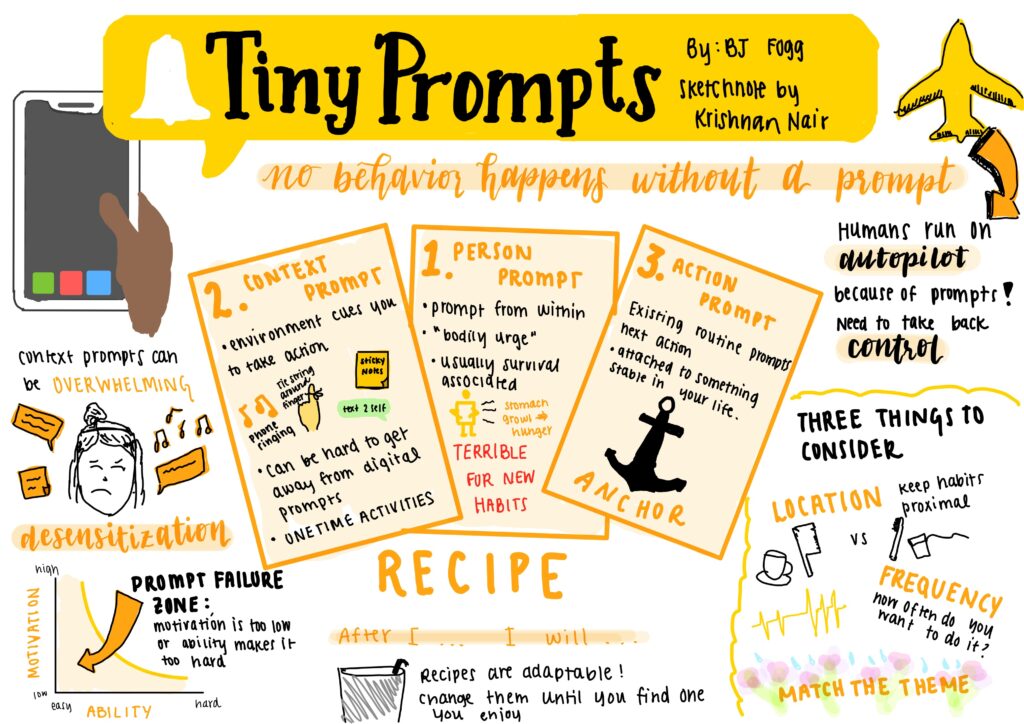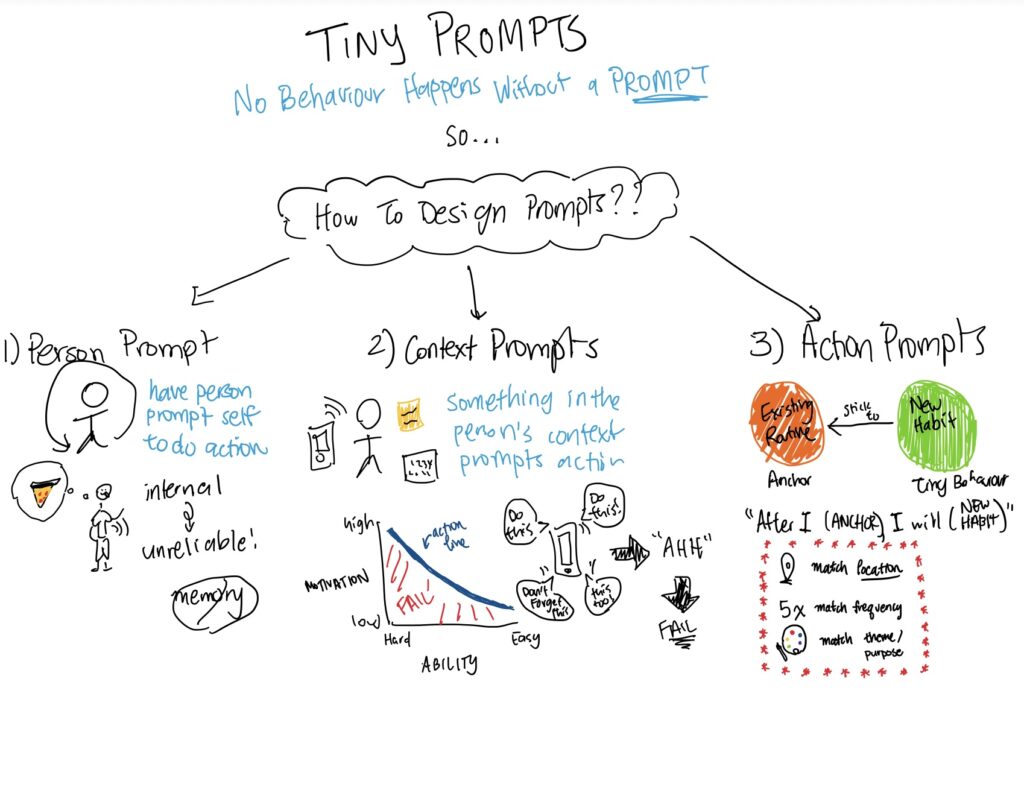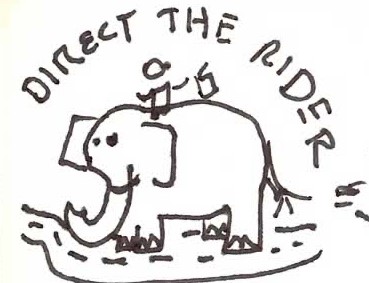Before this class, I hadn’t thought about behavior change in depth, especially not about anyone’s behavior change other than my own. To be honest, when I thought about changing my own behavior, I almost always viewed it as just a matter of motivation – thinking that all I needed to do was want something enough. If I stopped and really thought though, at almost no point in my life have I ever accomplished something on pure motivation. I have been plenty motivated to do lots of things, but pretty predictably failed within a week of starting them. This way of thinking has greatly changed in this class, and I feel as though I have learned an immense amount this quarter.
Going into this class, I immediately started to reevaluate how I viewed behavior change. Most of the models we learned were relatively simple, and once explained, seemed obvious. Like, of course it isn’t enough to just be motivated – the environment you surround yourself in and the prompts you have also are going to influence if you actually follow through on your desired changes. Although these seemed simple once explained, it opened up a new world of possibilities for me, and encouraged me to think beyond just motivation when it came to behavior change.
I think if I were to change how the project was done, I would have spent more time at the beginning selecting a topic. Realistically, I was never that passionate about our team’s topic, and I don’t think the rest of the team was either. We chose it because it was a relatively safe bet, and it remained that throughout the project. As a result, I do wish we had had more time at the beginning to really think about potential project areas and brainstorm needs in a structured manner, in order to find an area that truly excited us. Once we started on the project, I really enjoyed the process of applying our learnings into direct work, but there were also moments in the class which gave me a lot of clarity into who I want (and don’t want) to be as an engineer. Although I enjoyed the class, I think I also left it realizing that HCI is a field that I find interesting and informative, but isn’t necessarily how I see myself spending my career. I don’t enjoy a lot of the work of design, and frequently found myself wishing I was coding instead. This is in no way a negative reflection on the class, and I know that as a software engineer I will find it incredibly useful to have insights into the work that designers do. But for me, especially as I start my graduate degree, it was very personally useful to get clarity on the type of work I want to spend my career doing.
Looking forward, I still do have some unresolved questions about our project. Most importantly, I question if it would have any real long term effect. I understand the limitations of time, and that in a 10 week course there is only so much that can be done. But I do wish that we had been able to collect data for more than 5 days in our intervention studies, and instead been able to study over a month or even several months. In my experience, I can normally sustain a new habit for approximately 8 days on sheer willpower and intense motivation, before habits and environmental factors begin to kick in. It was never completely clear to me from our intervention studies if 5 days of doing the behavior would translate into actually being willing to form a new habit, and so that will be my biggest unresolved question as I leave this class. I suppose that’s always how it is though – in classes and in business – when would it not be nice to have more time, or more data?
Thinking about the ethics of our project in general, I for the most part feel comfortable with the product we have created. I think the general idea – helping students to connect with family members – would have a net positive effect on society if widely adopted, and our secondary research overwhelmingly showed that there are proven benefits to having relationships with family. We discussed how we would make the product secure, and all agreed that we would respect user privacy and not sell data. However, several ethical issues do arise for me about the process of our product. The first is that realistically, we designed a product for ourselves. The reason we chose this topic was that I mentioned during our first meeting that I struggle to contact my grandparents every week but wish I did call more frequently. This was never hidden or implicit – our ideal users, and most of our personas, were always college students. However, I wish that we had discussed more the ethics about how resources get devoted, and which problems are chosen to solve. I don’t think there is anything inherently unethical about choosing to solve an issue that affects you or your community. And indeed, when that choice helps you to design for an actual need or helps to prevent stereotyping, it can indeed be a deeply ethical choice to do so. However, when this pattern repeats on scale, the effect is deeply unethical: products created largely for and by educated users, many of whom are white, upperclass and straight cis men. I don’t think there is a simple solution to this, but I do wish our team had at least discussed it more, rather than taking the easier path of designing for a group we had easy access to. I also wish that we had discussed more in depth the realities of the world, and the ways in which this product works well in the abstract, but best case would be unprofitable, worst case could be changed to become a personal data mining operation under the guise of family connection. I understand that this class isn’t a business class, but I often wish that there was more time given in CS, and in particular HCI, classes at Stanford to discuss the market feasibility of a product. In particular, with so many of our ethics discussions, it was easy to just say “yeah, we’d be ethical. We’d never sell user data, or manipulate users, or get them addicted to our app”. But that strategy doesn’t work as well when you have bills to pay, and I do wish that we had had more opportunities to discuss that in depth.
Going forward, there is so much from this class I will take with me, about behavior change, design in general, and ethics. From a behavior change perspective, I will certainly focus less on just motivation, and more on one’s environment and the ways in which prompts can be used so they are actually effective. In design in general, a lot of the ways in which designs prompt us have changed the way I have viewed the technology I use and create. I will certainly try to be more selective about how I give users information, and try to become more rigorous about testing interfaces before just jumping into coding, as much as I love to just code a solution and then fix it afterwards. I plan on going into software engineering, and I will definitely be thinking more about how even small design choices can have a huge impact on how customers interact with a product. From an ethical perspective, I think in a lot of ways I walked away from this class even less optimistic about the state of the tech industry than I was at the beginning. Realizing that so many of my classmates are going to be the next leaders in the tech industry, I’ve started to think more and more about how few of us spend any critical time thinking about how our work will impact the world. Moreover, in so many of our discussions, it felt like we ultimately got nowhere with our ethics discussions, or any of the conclusions we came to were couched with “in an ideal world / if you don’t just focus on profit / we live in a capitalist society”.
I know that this isn’t a very optimistic reflection overall, and I want to end it on a note that although I may not be optimistic about the state of technology in general, I am so very glad that classes like this are taught at Stanford. Even if I don’t become a designer, I know that I will be a more effective, (hopefully) more ethical, and overall more human focused software engineer because of classes like this. I won’t be as apt to blindly create technology without consideration of the actual impact it will have, both intended and unintended, and for that I am very grateful.



